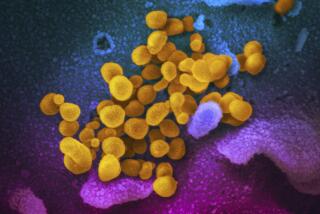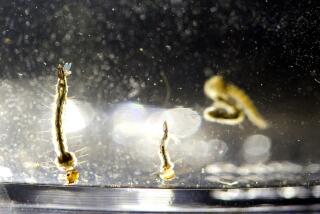EPA Scolds Scientist for Unsanctioned Gene Test
- Share via
WASHINGTON — The Environmental Protection Agency on Thursday reprimanded a Montana scientist for not getting permission before injecting elm trees with genetically altered bacteria.
The agency sent Gary Strobel of Montana State University’s plant pathology department a letter warning him not to do it again and saying he needs a co-sponsor if he applies for EPA approval of an experiment in the next year.
“I don’t think that there is anything else we could do with Dr. Strobel,” said John A. Moore, assistant EPA administrator for pesticides and toxic substances. “I think in some respects one might say they are mild sanctions.”
Informs Safety Panel
Strobel told the university’s biosafety panel earlier this month that he injected the genetically altered bacteria into 14 elm trees on the Bozeman, Mont., campus without approval. The experiment was to determine if the bacteria would produce enough of an antibiotic to kill the Dutch elm disease fungus.
Strobel had said his action was a form of “civil disobedience” against regulations he considers to be too restrictive.
Moore said a faculty member at Montana State tipped the EPA that the experiment was being run, and Strobel acknowledged it in a conversation with agency employees.
Strobel applied for agency approval after the experiment had started, Moore said. The EPA returned Strobel’s application and additional information, saying “there is little to be gained by our processing an application for an experiment that has already been initiated.”
Doubts Agency’s Authority
The agency does not have the legal authority to do more than send a warning letter to an offender in Strobel’s situation, Moore said. A second offense could bring a fine of $1,000 and possible criminal prosecution, he said, adding that he did not know what criminal penalties could be imposed.
Moore said the agency did not believe that the bacteria being used by Strobel in the experiment were dangerous or that the research posed any great risk.
More to Read
Sign up for Essential California
The most important California stories and recommendations in your inbox every morning.
You may occasionally receive promotional content from the Los Angeles Times.













